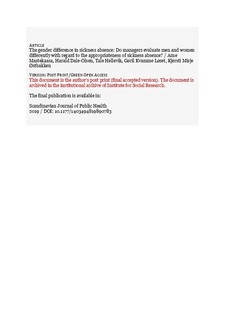The gender difference in sickness absence: Do managers evaluate men and women differently with regard to the appropriateness of sickness absence?
Peer reviewed, Journal article
Accepted version
Permanent lenke
http://hdl.handle.net/11250/2635546Utgivelsesdato
2019Metadata
Vis full innførselSamlinger
Sammendrag
Aims: Women have much higher rates of sickness absence than men, but the causes of the difference are not well understood. This study examines whether managers have more lenient attitudes toward women’s than toward men’s absence, as this might contribute to higher rates of sickness absence among women. Differences between managers and other employees are also assessed. Methods: Vignettes were used to measure attitudes toward the legitimacy of sickness absence. The vignettes consisted of brief case descriptions of individuals considering asking their physicians for sick leave, with information about the medical condition (mainly taken from the descriptions in ICPC-2), occupation and gender. Respondents judged how appropriate sickness absence was in each case. Quota sampling was used, and the effective sample size was 899 managers and 1396 other employees, and each respondent evaluated either four or six vignettes. Generalised ordinal logistic regression was used. Results: The gender of the vignette person had no effect on the managers’ evaluations of the appropriateness of sickness absence. Irrespective of the gender of the vignette person, however, managers were generally more restrictive than non-managers. Conclusions: Different attitudes on the part of managers toward sickness absence in men and women do not seem to contribute to gender differences in sickness absence, but managers are generally more restrictive than are non-managerial employees. The gender difference in sickness absence: Do managers evaluate men and women differently with regard to the appropriateness of sickness absence?
